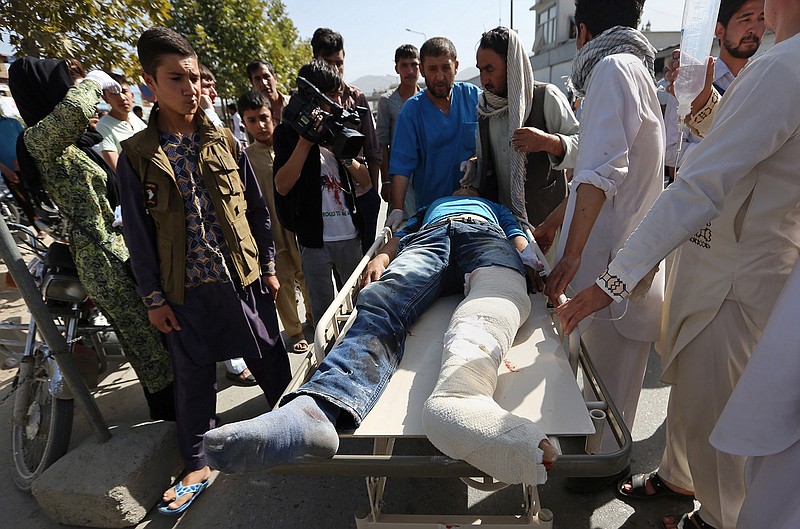KABUL, Afghanistan-The Islamic State group has claimed responsibility for a suicide bombing on a peaceful protest in the Afghan capital on Saturday that killed at least 80 people and wounded more than 200, marking the first time the extremists have struck Kabul and raising fears of their growing strength and capability in Afghanistan.
The attack was the deadliest to hit Kabul in 15 years of civil war. It struck a demonstration by Afghanistan's Hazara ethnic community, who were marching for a major regional power line to be routed through their home province. The Hazaras are Shiite Muslims, most Afghans are Sunnis.
Footage on Afghan television and photographs posted on social media showed a scene of horror and carnage, with numerous bodies and body parts spread across the square. Bloodied survivors were seen being dragged clear for help, others walked around dazed or screaming.
Two suicide bombers had attempted to target the demonstrators, but one of them was shot by police before he could detonate his explosives, according to Haroon Chakhansuri, a spokesman for Afghan President Ashraf Ghani. He said that three city district police chiefs were injured and another three security personnel were killed.
Witnesses said that immediately after the blast, security forces shot in the air to disperse the crowd. Secondary attacks have been known to target people who come to the aid of those wounded in a first explosion.
Road blocks that had been set up overnight to prevent the marchers accessing the city center or the presidential palace hampered efforts to transfer some of the wounded to the hospital, witnesses said.
Angry demonstrators sealed some of the area around the square, and prevented police and other security forces from entering. Some threw stones at security forces.
Outside hospitals, huge queues formed as the public offered to donate blood.
The Afghan Interior Ministry said that 81 people had been killed and 231 wounded in the bombing. The ministry's deputy spokesman, Najib Danish, said the blast was the biggest in Afghanistan since 2001, when the Taliban launched their brutal insurgency after they were toppled by the 2001 U.S. invasion.
According to the presidential spokesman, Chakhansuri, the organizers of the march had been warned of the possibility of an attack. "We had intelligence over recent days and it was shared with the demonstration organizers, we shared our concerns because we knew that terrorists wanted to bring sectarianism to our community," he said.
Senior Hazara leaders were notably absent despite having attended a similar protest in May. The organizers could not be immediately contacted for comment on Chakhansuri's allegations.
The Islamic State group claimed responsibility for the attack in a statement issued by its news agency, Aamaq.
IS has had a presence on Afghanistan's eastern border with Pakistan, mainly in Nangarhar province, for the past year, but this is the first time the extremist group has struck the Afghan capital. The bombing raises concerns over IS's growing capabilities in Afghanistan.
Officials believe the fighters are made up of disaffected Taliban insurgents and members of Pakistani militant groups, and that they receive some funding and arms from IS in Syria and Iraq. In Nangarhar they have fought Taliban fighters as well as Afghan security forces, sometimes seizing control of whole districts in the east of the province.

